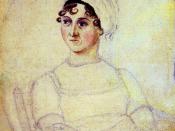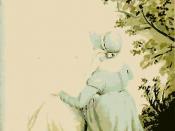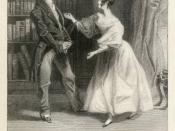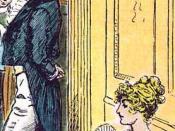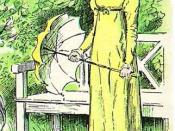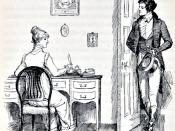Throughout Pride and Prejudice, Jane Austen describes different characters who act as foils to her main protagonist, Elizabeth Bennet. Charlotte Lucas is a good example. Her close friendship with Elizabeth allows us to monitor their interactions and recognise both similarities and contrasts between them.
We are introduced to Elizabeth Bennet in the first chapter of Pride and Prejudice when her father describes her as having ÃÂsomething more of quickness than her sistersÃÂ (pg.7). This reveals her intelligence despite being only ÃÂone and twentyÃÂ (pg.162). Her intelligence is also revealed by the way she is able to hold her own when confronted by or interacting with the other characters in the book. We are given a similar notion of Charlotte Lucas, being described as ÃÂa(n)...intelligent womanÃÂ (pg.19). Although Elizabeth is younger than Charlotte, who is ÃÂabout twenty-sevenÃÂ (pg.19), we can immediately surmise that they are intellectually compatible and are not surprised to find Charlotte called ÃÂElizabethÃÂs intimate friendÃÂ (pg.19).
Although Elizabeth Bennet is often portrayed as socially unconventional, she never loses her soft femininity (www.collegeresearch.us). She is described by Darcy to be pretty and have fine eyes: ÃÂ...the very great pleasure which a pair of fine eyes in the face of a pretty woman can bestowÃÂ (Pg.27). He also mentions that her figure is ÃÂlight and pleasingÃÂ (Pg.24). After initially saying she is only tolerable to look at, Darcy later describes her as ÃÂone of the handsomest women of my acquaintanceÃÂ (Pg.259). Colonel Fitzwilliam is said to be caught up by her prettiness (www.pemberley.com). Charlotte however is described as a rather plain girl and the men do not seem to show her much attention. This possibly contributes to her harsh view of men. Mrs. Bennet says of Charlotte and her sisters: ÃÂshe is very plainÃÂ and ÃÂit is a pity they are not very handsomeÃÂ (pg.44).
Elizabeth has a ÃÂlively, playful dispositionÃÂ (pg.14). This is evidenced by the way she makes fun of Mr. DarcyÃÂs comment about her being only tolerably good looking. Austen writes: ÃÂshe...delighted in any thing ridiculousÃÂ (pg.14). This playfulness can also be seen in the way she admits that she ÃÂlove(s) a laughÃÂ (pg.56). She often banters with the other characters and yet does not offend anyone ÃÂ ÃÂthere was such a mixture of sweetness and archness in her manner which made it difficult for her to affront anybodyÃÂ (Pg.51). Throughout the novel, Elizabeth makes witty comments and is even described as vivacious by Mr. Collins (Pg.104). In fact it is her ease and articulate way of handling conversation that has made Darcy ÃÂbewitchedÃÂ by her (pg.51). Although it is never mentioned directly, it would appear as if Charlotte is more reserved and serious than Elizabeth. She is never found joking, but rather giving sound advice. For instance when Elizabeth finds pleasure in the way Jane expresses her feelings to Bingley, Charlotte very seriously recommends that Jane had better be more open with her affections (Pg.22/23). She inevitably exhibits the ÃÂsilence and respectÃÂ that Mr. Collins is looking for in a wife.
Elizabeth Bennet is also an independent thinker. She does not conform to the expectations of society (Cummings, M. 2009). This is seen when she tramples through the mud to visit a sickly Jane, knowing that her appearance and actions will be criticised as unladylike. Yet, her independence is shown to be within ÃÂreasonable limitsÃÂ (Joubert, Z. 2009:57). She is concerned with ÃÂpropriety, good manners and virtueÃÂ and she stands up for what she believes (www.gradesaver.com). Elizabeth also shows her independence by not being awed by wealth and titles. She seems to rebel against the popular idea of class in society (www.collegeresearch.us). This is especially seen when she refuses to cower before Lady Catherine and her threats. Charlotte, on the other hand, shows how Elizabeth ÃÂshouldÃÂ behave. She goes along with the tradition of that time to marry for status and money. She does what is socially acceptable, disregarding her own feelings on the matter. She is submissive to the social order, whereas Elizabeth believes that respect should be earned and not just given because of rank.
Another striking difference between these characters is their integrity. The way in which Charlotte plots to marry Mr. Collins after Elizabeth has rejected him, shows us that she is cunning. She has hidden motives when she spends more time with Collins under the pretence of being useful. Contrary to this, Elizabeth is open and does not scheme. Darcy says ÃÂwhatever bears affinity to cunning is despicableÃÂ (pg.40). We notice that Elizabeth is always morally upright, not deceiving for the sake of advancement. Charlotte, however, is not. ElizabethÃÂs strength of character is shown by the way she rejects both the proposals of Mr. Collins and Darcy. Unlike Charlotte, Elizabeth does not make her decisions on the basis of financial security. She exhibits great character by acting on principle and following her conscience, despite the dictates and pressures of Victorian society (Cummings, Michael. 2009).
The biggest contrast between these two friends is their different approach to love and marriage. Elizabeth emphasises the importance of love and emotion within marriage. She has witnessed the unhappy marriage of her parents and ÃÂshe would not consider marrying a man if she is not in love with him and did not think that they could be happyÃÂ (www.collegeresearch.us). For her, love is a principle and she does not take the easy way by accepting the hand of Collins or Darcy when she does not love them (Anderson, Walter. 1975). Elizabeth pursues happiness whereas Charlotte pursues comfort. Charlotte sees marriage as just another stage in life; ÃÂwithout thinking highly either of men or of matrimony, marriage had always been her objectiveÃÂ (pg.122). Her motive for marriage is unemotional and practical. To Charlotte, ÃÂhappiness in marriage is entirely a matter of chanceÃÂ (pg.24). She marries Collins ÃÂsolely from the pure and disinterested desire of an establishmentÃÂ (pg.120). Marriage in this case would provide her with a comfortable home and the status of being a married woman. To Elizabeth ÃÂmoney is no recompense for feelingÃÂ (www.bibliomania.com). She is shocked by CharlotteÃÂs unsentimental indifference towards love and romance. Their differing view in this area almost causes the loss of their friendship. Elizabeth feels that "all the comfort of intimacyÃÂ is over because Charlotte has ÃÂsacrificed every better feeling to worldly advantageÃÂ (Pg.123).At the end of Pride and Prejudice, we see that Elizabeth has come to terms with CharlotteÃÂs decisions and their friendship continues despite their differing views regarding love and marriage.
Charlotte Lucas is portrayed as a character that is quite contrary to the protagonist Elizabeth Bennet. By creating a character such as Charlotte, who has a typical Victorian outlook, alongside Elizabeth, who has a more modern outlook, Austen manages to highlight ElizabethÃÂs good and bad qualities. During an age of strict stereotypes, Austen has managed to create a female protagonist that epitomises strength, intelligence and femininity (www.collegeresearch.us).
Bibliography:1. Austen, J. (2003). Pride and Prejudice. London: Penguin Books, Ltd.
2. Joubert, Z. (2009). English 1B ÃÂ Study Manual. SA: ICP3. Anderson, Walter. (1975). Plot, Character, Speech, and Place in Pride and Prejudice. Ninteenth Century Fiction, Vol.30, No.3. pg. 372. Retrieved August 6, 2008 from http://www.jstor.org/stable/29330754. Pride and Prejudice Study Guide. Retrieved September 8, 2009 from http://www.gradesaver.com/pride-and-prejudice/study-guide/character-list/5. Pride and Prejudice Hypertext. Retrieved September 9, 2009 from http://www.pemberley.com/janeinfo/ppdrmtis.html#ElizabethBennet6. Cummings, Michael. (2009). Pride and Prejudice: A Study Guide. Retrieved September 8, 2009 fromhttp://www.cummingsstudyguides.net/Guides7/PrideandPrej.html7. Pride and Prejudice Study Guide. Retrieved September 8, 2009 from http://www.bibliomania.com/1/7/6/2017/frameset.html8. How Does Jane Austen Represent the Themes of Love and Marriage in Pride and Prejudice? Retrieved September 8, 2009 from http://www.collegeresearch.us/show_essay/45809.html9. Pride and Prejudice - Charlotte Lucas and Elizabeth Bennet. Retrieved September 8, 2009 from http://www.collegeresearch.us/show_essay/36688.html
